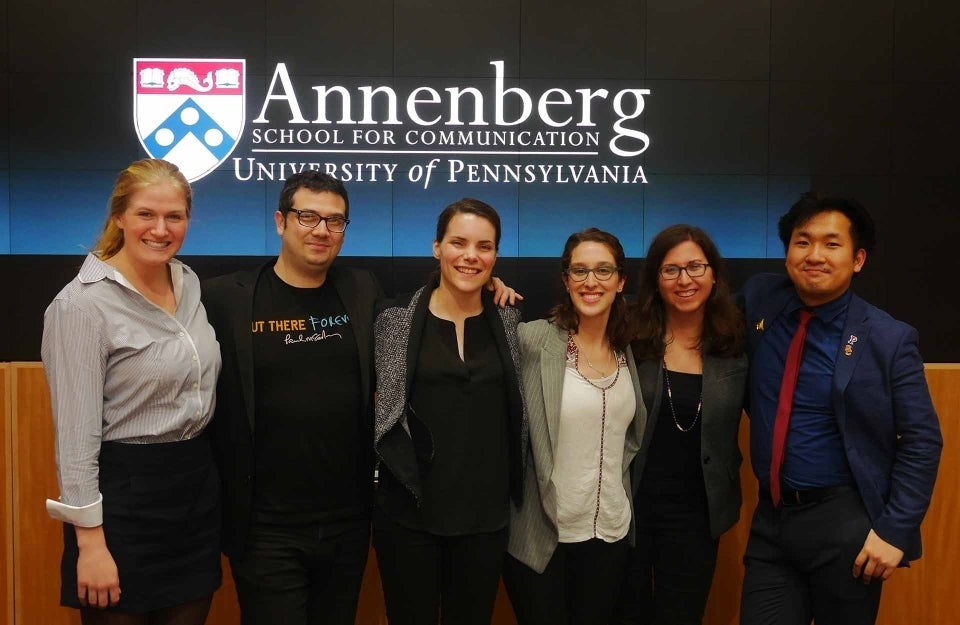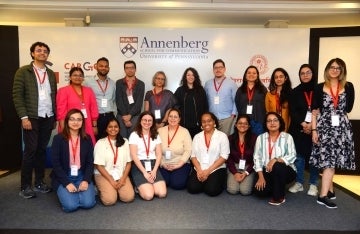From "Mother Jones" to "Interstellar": Doctoral Candidate Danny Kim Studies Branding and Media Preferences
Kim studies the branding of media products and how users perceive brand personality.

Annenberg graduate students (L to R) Natalie Herbert, Yotam Ophir, Christin Scholz, Celeste Wagner, Allyson Volinsky, and Danny Kim
Apple or Android? Nearly everyone prefers one over the other, and companies spend millions of dollars to construct appealing brands that aim to resonate with how their target users may see themselves or aspire to be seen.
A fourth year graduate student at the Annenberg School for Communication at the University of Pennsylvania, Danny Kim studies the branding of media products, and he says that this principle is also relevant to media preferences. We like movies, TV shows, music, and other media products that represent or reflect who we are or who we want to be.
“Media products are experiential goods,” he says, “and you don’t really know what you’re getting until you’ve already consumed it. This gives content creators an incentive to craft particular brands in order to develop a customer base.”
His research focuses on how individuals perceive media products’ brand personality, how those perceptions can be predicted, and how people’s self-perception and brand perception combine to influence their media preferences. Much of the existing research on brand personality comes from a marketing perspective. As a media effects scholar, Kim is interested in considering these ideas through the lens of Communication.

In a paper published earlier this year in the International Journal of Communication, Kim explored perceptions of brand personality as they pertain to media by examining individuals’ opinions of news media outlets across the political spectrum, including Mother Jones, the Washington Post, Breitbart, and more. Unsurprisingly, he found that the more liberal someone was, the more aggressive and less heroic in personality they rated conservative outlets to be, and vice-versa for a more conservative person.
Marketing research has shown that when you feel that a brand has a similar personality to your own, you feel more positively toward it. Kim’s work has begun to examine how this effect may manifest with media products to influence media preferences.
His dissertation — for which Kim received a Russell Ackoff Fellowship from the Wharton Risk Management and Decision Processes Center — expands on his past research to consider brand-self congruence as well. He conducted two surveys to collect data on movie preferences. The first survey asked naïve respondents to rate the top 250 grossing movies in the United States using personality trait ratings, like aggressive, honorable, and romantic. He used these responses to create a database of mean personality trait ratings for each movie, as well as to see how visual and text elements in the movie posters and summaries could predict personality ratings.
In the second survey, participants indicated their most and least preferred movies in various contexts, including “to watch with friends” and “to watch alone,” and rated their own personality. By referring to the database he created from the first survey, Kim was able to use data from this second survey to calculate participants’ degrees of personality congruence with their most preferred and least preferred movies and compare these values.

Committed to the idea of bridging theory and practice, Kim pursued an internship this past summer with Paramount Pictures. He was looking for an opportunity to apply his research skills in an industry setting, and he was able to do just that at Paramount. Through independent research projects, he explored the possible future of emerging media, like augmented and virtual reality, and how they might be of interest to the entertainment industry.
“My internship at Paramount gave me first-hand affirmation that careful research and creative instinct can ultimately go hand-in-hand to help bring about the best, most engrossing entertainment experiences,” Kim says.
Kim holds three masters degrees: one in Communication from the Annenberg School at the University of Pennsylvania, one in statistics from the Wharton School at the University of Pennsylvania, and one in communication management from the Annenberg School at the University of Southern California (USC). His bachelor’s degree is in interactive entertainment from the School of Cinematic Arts at USC. He hopes this background, combined with a doctoral degree in Communication, will help him find a job in the entertainment industry.
“I want to use my skills to bring about strategic, measurable advancements in how we tell stories and to help develop story worlds that linger in our minds long after we step away from the screen,” he says.



